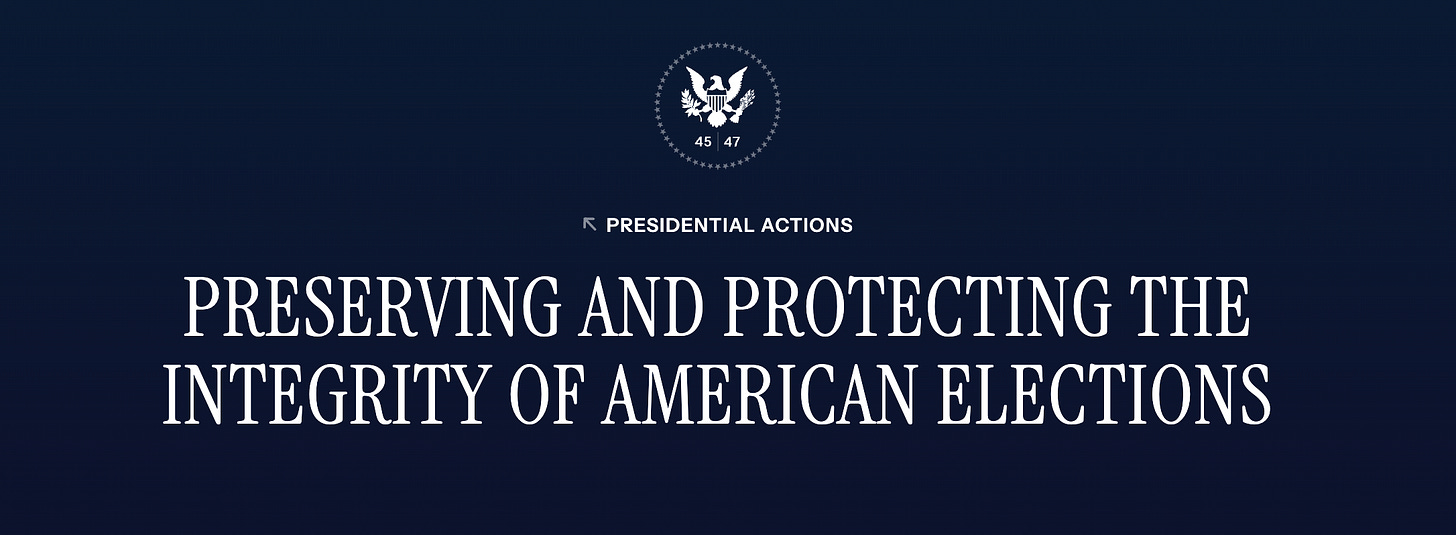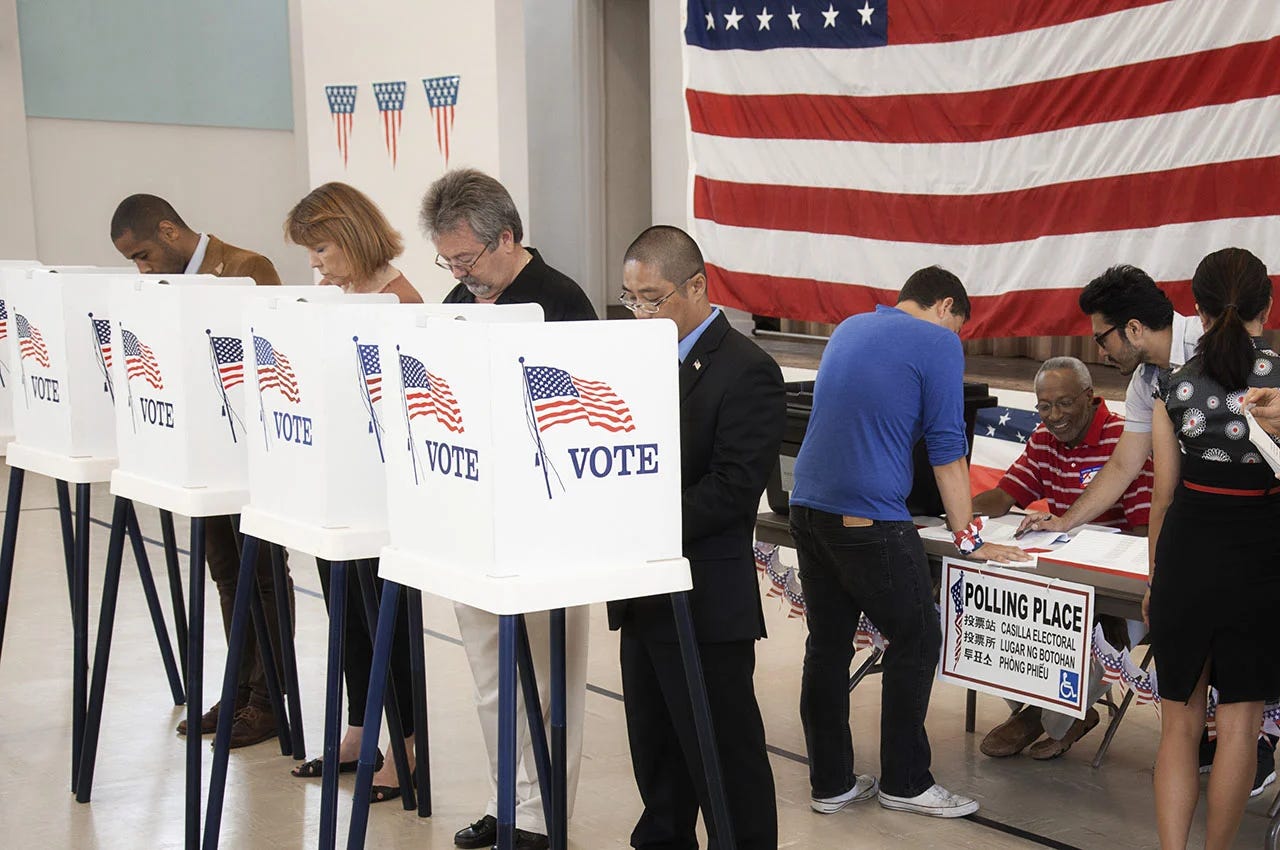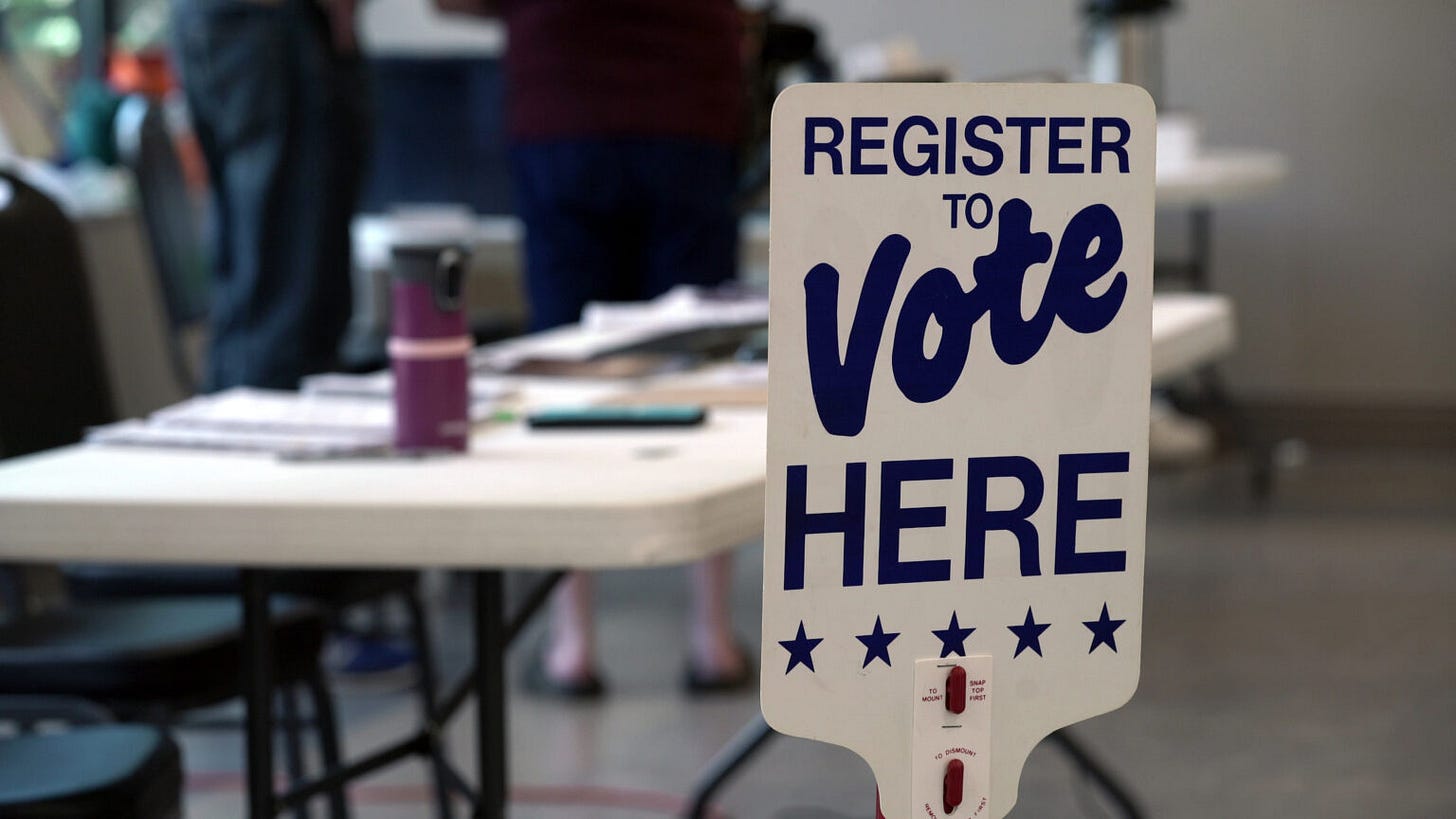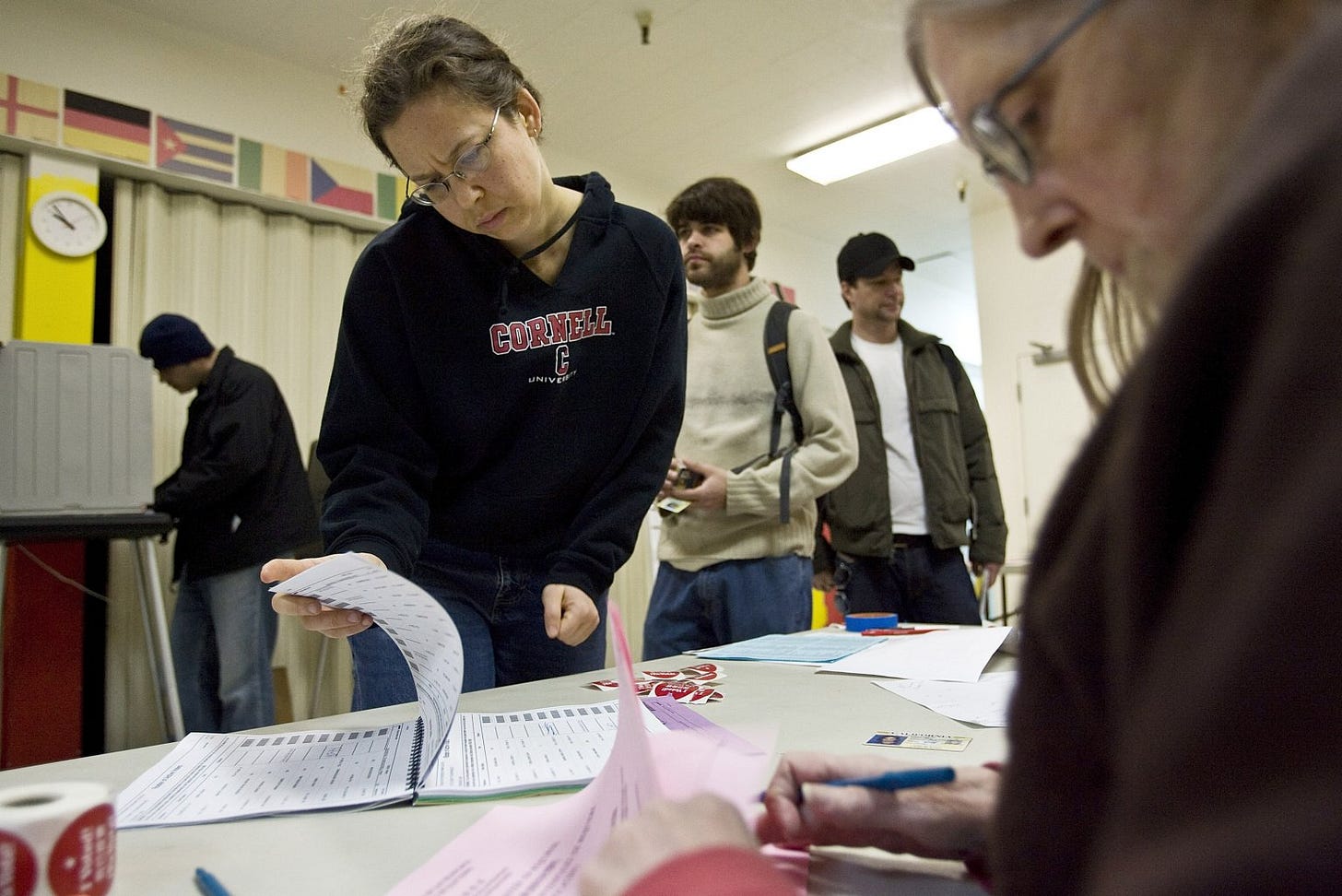The Order That Could Block Millions From Voting
Election fraud is still top of mind for Donald Trump, despite winning both the electoral college and the popular vote in 2024. Chief among the problems he perceives is that there are large numbers of non-citizens voting — and last week, he signed a new executive order targeting this.
If the executive order holds up against pending legal challenges, it could change how large numbers of Americans vote and register for elections.
According to the order “Preserving and Protecting the Integrity of American Elections,” voters must now show proof of citizenship in order to register, mail-in ballots are illegal to count if they arrive after Election Day, the federal government has the right to seize and inspect voting equipment, and more.
Legal and election experts say that the executive order isn’t constitutional and that its requirements could prevent millions of American citizens from voting. Here’s what you need to know.
How does it work now?
The Constitution gives states the right to conduct elections. Even in elections for federal office, the federal government does not deal with the logistics of voters casting their ballots, except to protect their civil rights. Because of this, there isn’t one set way to register to vote in the US – each state has its own rules.
In most states, the Secretary of State’s office runs elections, and people can register online, by mail, or in person. (We have a page that helps you find all of the info you need to register in your location at SharonMcMahon.com/vote.) Every state requires ID to prove your identity in order to register, and some states like North Dakota don’t even have voter registration – you have to bring the required documentation for every election.
Congress made it easier for Americans to register to vote and to maintain their registration in 1993 when it passed the National Voter Registration Act, sometimes called the Motor Voter Act. The law says that when people apply for or renew their driver’s license, they must also be given the chance to register to vote. The state then has to send their completed voter registration application to the right election officials.
Less than 10 years later, Congress passed the Help America Vote Act of 2002, which required states to verify the information of new voters in elections for federal office. Every state had to create a computerized voter registration list and check voter details with the Motor Vehicle Administration (MVA).
If a person has a driver’s license, their number must be matched with the MVA’s database. If they don’t have a license, the state can confirm their identity using the last four digits of their Social Security number (SSN). Forty-four states and DC use this process. Five states use all nine SSN digits for verification. Again, North Dakota is the outlier, and they don’t use this system.
What does this executive order change?
1. You now have to prove citizenship to register
The order forces people to show official documents proving they are US citizens before they can register to vote – which is different from verifying your identity. Acceptable documents include a US passport, a military ID, or a REAL ID that shows your citizenship status.
Some states require you to re-register to vote every time you move, and if that’s the case, you will then have to provide proof of citizenship if you ever relocate.
One of the biggest obstacles for showing proof of citizenship is that most driver’s licenses, even those that are REAL ID compliant, don’t display the citizenship status of the holder, so a driver’s license alone would not be enough for most people. Here is what the order says are acceptable forms of ID to prove citizenship:
1. A passport
2. A REAL ID compliant ID that shows citizenship
3. A military ID that shows citizenship
4. Another state or federal photo ID indicating citizenship or accompanied by other proof of citizenship
If you’ve lost important documents like your passport, you might need to replace them before you can register to vote – which can potentially cost $165 and take months to replace.
The Preamble reached out to Jonathan Diaz, an attorney with the watchdog Campaign Legal Center and asked him if a REAL ID compliant driver’s license is enough to register to vote, or if additional proof of citizenship was needed as well. "Under the terms of the [President’s] Order, if it were enforced, a REAL ID would not be sufficient to prove citizenship for purposes of voting. Only a REAL ID that indicates the holder's citizenship on its face would satisfy the requirement. Those are called Enhanced IDs and are only available in 5 states,” Diaz said.
The five states that offer them –Michigan, Minnesota, New York, Vermont, and Washington – all border Canada, and Enhanced IDs are meant to be an alternative to passport that allow you to enter Canada, Mexico, and some countries in the Caribbean.
Diaz added, “Only about half of U.S. citizens have a passport. About 9% of voting-age citizens (more than 21.3 million people) do not have ready access to documentary proof of citizenship.”
“The number of voters who would be affected by the proof of citizenship requirement in the Executive Order is likely higher – because under the terms of the Order, a U.S. birth certificate is not one of the approved citizenship documents,” according to Diaz.
This would also likely prevent things like voter registration drives on college campuses – or at a minimum, would require registrants to jump through additional hoops to provide the documentation after registering.
2. Cracks down on mail-in voting
The order bans counting mail-in ballots that arrive after Election Day, no matter when they were sent. Some states currently allow ballots that are postmarked by Election Day to be counted, even if they arrive a few days later.
The executive order says mail-in ballots would have to arrive by election day, and there is not an exception listed for members of the military who are sending in ballots from overseas.
3. Requires the federal government to review state voting data
The order requires government agencies like the Department of Homeland Security, DOGE, and the Social Security Administration, to compare, including by subpoena, each state’s voter rolls against various databases, in an effort to ensure that states are maintaining accurate records of who is eligible to vote. It also gives the federal government the power to access election equipment, ballots, and all other materials used to conduct an election for federal office.
According to Diaz, “The Order instructs Elon Musk and the DOGE service to work with federal agencies to try and access state voter registration databases (something the federal government lacks authority to do) to try and identify non-citizens, and directs them to use government and commercial databases that are known to be unreliable for proving current citizenship status,” he said.
“When other states like Alabama and Texas have tried similar programs, they have failed – and those states have been successfully sued for unlawfully removing eligible naturalized US citizens from the rolls based on bad data,” Diaz added.
History also shows that similar attempts in Kansas and Arizona to make it harder for voters to register have failed to hold up.
In Kansas, a law that went into effect in 2013 ended up preventing more than 31,000 eligible US citizens from registering to vote — that was 12% of all first-time voter registrations in the state. After people in Kansas challenged the state’s law, both a federal judge and a federal appeals court ruled that the law was impermissible.
The courts held that because there was very little proof of widespread issues with non-citizens voting, Kansas couldn’t defend a law that blocked thousands of eligible citizens from registering just to prevent a few noncitizens from signing up. In other words, disenfranchising a lot of people was worse than keeping a few ineligible people from registering.
In 2022, Arizona passed two laws that made voters show proof of citizenship and to list their birthplace to vote in state and local elections. But earlier this year, the 9th U.S. Circuit Court of Appeals struck the laws down, saying they unfairly targeted Latino, Native American, and student voters.
4. Punishes states that don’t comply
If states refuse to follow the new rules, they could lose federal funding for elections. The order also allows the federal government to take legal action against states that don’t enforce stricter voting regulations.
Who would this impact?
There’s still a lot we don’t know about how Trump’s executive order would be carried out if it takes effect. But according to the experts, it would make registering or re-registering to vote much more difficult. People who change their names due to marriage, for example, will have difficulty proving citizenship, as things like marriage licenses may demonstrate the reason for a name change, but not which country one is a citizen of.
Aside from adults who change their names (with the majority being women due to marriage), the executive order has the potential to disproportionately affect the elderly, especially those born in rural areas or at home who lack the appropriate documentation to get a passport or other ID, and people of color – especially some Black, Latino, and Native American communities, who have not always had their births officially recorded with a state in the way other groups have.
Other questions remain. Like if millions of Americans have to re-register, how long would that take? Could it cause huge delays for people trying to vote?
Election law experts told The Preamble that the executive order is likely unconstitutional, because the president doesn’t have the power to control elections.
“This Executive Order is an unconstitutional power grab aimed at giving the President unprecedented control over American elections despite the Constitution's clear grant of that authority to Congress and the States,” Diaz said. “The end goal of the policies in this order is to make it harder – if not impossible – for millions of eligible U.S. citizens to vote.”
But it has its supporters too.
Georgia Republican Secretary of State Brad Raffensperger, who had a disagreement with Trump after the 2020 election when Trump asked him to “find 11,780 votes” to help him win in Georgia against Joe Biden, praised the president’s executive order.
“Thank you, President Trump, for this executive order ensuring that only American citizens decide American elections. This is a great first step for election integrity reform nationwide,” Raffensperger said. “I strongly believe that only American citizens should be voting in our elections, and I’m pleased to see that other states will follow Georgia’s lead.”
Ohio Republican Secretary of State Frank LaRose also expressed his support for the order. "I appreciate President Trump’s decisive leadership to protect the integrity of our elections," LaRose said. "Fortunately, I can say that a lot of this we already do in Ohio, but where there’s an opportunity to do more we can certainly work with our state and federal lawmakers to address it.”
Legal challenges are coming
But don’t expect smooth sailing from here. “There are a very few parts of the EO that are lawful,” Justin Levitt, a constitutional law professor at Loyola Marymount, told The Preamble.
The president’s executive order is already being challenged in court, with more lawsuits expected. The Democratic National Committee, the Democratic Governors Association, and Senate and House Democratic leaders have already filed a suit. “This executive order is an unconstitutional power grab from Donald Trump that attacks vote by mail, gives DOGE [Department of Government Efficiency] sensitive personal information, and makes it harder for states to run their own free and fair elections,” their statement said. “It’s anti-American, and Democrats are using every tool at our disposal – including taking Trump to court – to stop this illegal overreach that undermines our democracy.”
The Campaign Legal Center (CLC) and the State Democracy Defenders Fund have also teed up a legal swing. They want the court to declare the order unconstitutional and block it from being enforced.
Is this an overreach of executive power or a permissible regulation of election integrity? We’ll find out in court.








As a member of the League of Women Voters, I can tell you, my student voter registration will be shut down by this EO. I register students at 17-1/2 (they can’t vote until 18) at my 5 local high schools, and there is no way they will have the docs with them to register. That’s the point!
My neighbor can’t prove her name change because her marriage license is from IL and has a wet stamp, but MO requires a crimped one. That’s the point!
All of the reasons listed in the article. That’s the point!
It is voter suppression!
There has never been voter fraud to justify these restrictions, only bigotry, racism, and misogyny.
Good guys make it easier to vote. We know who makes it harder.
This is not the first time we have had to fight for our right to vote. It took white women over 100 years. It took Black women even longer. We know how to do this.
And we will do this!
See you in the streets, Governerds!
As someone who works on voting day at the polls, this infuriates me. People who make these claims and try to add citizenship laws have no clue how voting works. These laws are nothing more than a blatant attempt to remain in power and keep people from exercising their right to vote.
IDs are checked at every polling station, the records are kept very tight and if you aren’t in the system you get found out quickly. Mail in, is the same, and when all is said and done ballot’s are check again and any discrepancy is noted and referred to a special election bipartisan committee.
Go work in your local precinct to see how an election works. You will likely, be surprised.